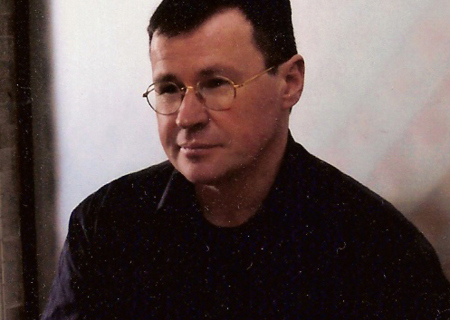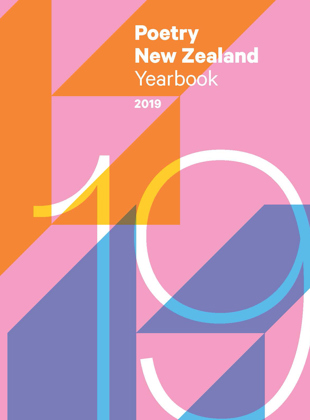Another Poetry New Zealand Yearbook is off to print. What are the strengths of the 2019 edition?
I think this may well be the issue I’m proudest of so far. We have a very strong poetry feature, from one of New Zealand’s most original — though still strangely neglected — poets. We have a nice blend of essays, ranging from the very personal (Elizabeth Kirkby-McLeod’s piece on her father’s suicide) to the profoundly learned (Erena Shingade’s analysis of Richard von Sturmer’s Zen poetics). We have deeply considered reviews of a range of recent books. Above all, though, we have a positive cornucopia of poems by hordes of poets old and new. I defy anyone not to find something to like in there.
How many submissions were there this time around?
272 email submissions (more or less) , together with 11 mail submissions: averaging four or five poems each — I guess that would add up to something like 1275 poems I had to read through to come up with the 100-odd I was able to include.
Was sifting through them to arrive at your shortlist of 126 any less challenging than usual?
No. It always takes far longer than I think it’s going to. First there’s the reading, and the initial winnowing of as few submissions as possible into the ‘potentials’ file. Those few keep on growing and growing, alas, because so many writers send in so many fine poems. Then there’s the final cutting and slashing at the longlist of poems I’d like to put in, designed to transform that category into poems I simply have to include.
There’s a great spread of age and experience in this book. Does the number of young writers bode well for poetry in New Zealand?
Well, yes, I think it does. Mind you, the subject matter of their poetry tends to be darker than I would like sometimes — but there’s no denying that the intensity of the emotions these young writers feel tends to concentrate their work amazingly. There’s nothing diffuse or self-indulgent about the best of them. But they seem only too aware that they’ve been doomed to live in interesting times. Franklin Roosevelt said in the 1930s that the generation then coming of age had ‘a rendezvous with destiny’ ahead of them. As it turned out, he was quite right. I can’t help feeling that the same may be true of this generation, too.
Why do some poets get two poems?
That’s an interesting one. I guess I start off looking for one poem from each submission, but some writers strong-arm me into taking more than one: the sheer merit of their work demands it. The default setting remains one each, but I can’t deny myself — and our readers — the pleasure of reading two excellent poems if they’re there on the page. It’s certainly got nothing to do with famous names or poetic reputations: just the quality of the work submitted.
This year’s featured poet is Stephanie Christie. When did you first come across her and why did you decide to feature her?
I think I first met Stephanie in the early 2000s. I’d seen her work in brief, and had in fact discussed it with the then editor, John Geraets. I didn’t really get it at the time, but he said that she lived in the same apartment block, and had shown him some work and he thought it at the very least worth taking a punt on. But then I heard her read at Poetry Live, and it was quite a revelation. I could see that she understood precisely what she was doing in fragmenting and breaking up her words in such an ostentatious and flamboyant way. I do understand why some readers continue to resist this L=A=N=G=U=A=G=E-influenced approach to poetry, but for myself I’ve long since concluded that her body of work has lasting value. To me, in fact, she’s one of New Zealand’s most unsung and undervalued poets.
Not one but two competitions this year! Tell us about the Poetry New Zealand poetry competition winners announced in this edition.
Yes, two quite different competitions. The first was the usual selection of the most outstanding poems submitted for each year’s issue. It’s an invidious choice, but when I first read Wes Lee’s poem ‘The Things She Remembers #1’, it completely transfixed me. When I heard it had already been accepted for publication elsewhere, I felt quite stricken. Luckily, though, the other magazine didn’t follow through, so I was happy to grab it for our pages. Brett Gartrell’s ‘After the principal calls’ was another strong contender for the top spot. Natalie Modrich’s ‘Retail’ is a bit of a change of pace, but it’s very amusing (it seems so to me, anyway). The winners this year are longer than in previous years: but I felt in each case that they needed that length to create the complex emotions their authors were dealing with.
And give us an insight into the student competition entries and winners.
The second competition, for school kids from Years 11, 12 and 13, was a real joy to judge. I chose a winner and three runners-up for each level, and I was spoiled for choice. The first prize winners from each have been included in the issue. There’s nothing naïve or half-formed about these poems, I have to say: they’re strong, confident work, by young writers who have a great deal to say. I hope that this success will help in encouraging each of them to keep writing: these are the kinds of young poets we will need in the future, I feel. I suppose that my personal favourite would have to be Aigagalefili Fepulea‘i-Tapua‘i’s passionate anthem ‘275 Love Letters to Southside’, but I like the slinky sensuality of Amberleigh Rose’s ‘Snake’s Tongue’ and the Joni Mitchell-like idealism of Kathryn Briggs’ ‘Earth is a Star to Someone’ very much also.
Can you see any sort of shift in content between the time six years ago that you took the helm as editor and this edition?
That’s an interesting question, too. Those first two issues look a bit tentative to me now. I hadn’t quite defined how my version of Poetry New Zealand would differ from Alistair Paterson’s — nor (for that matter) how the look of it might diverge from John Denny’s pared-back layouts. Nor did I realise at that stage that opening up the magazine to online submissions would encourage so many younger – as well as so many international — poets to send in work. The main difference, though, is that the poetics section, the essays and reviews, has grown much more varied and interesting — the poetry section was always strong.
Are there poetry books on your beside table at present or something else? What are you reading at the moment?
Well, at present I’m engaged in the rather lengthy task of rereading the greatest of the four classic Chinese novels: the Hung Lou Meng, or Red Chamber Dream (also known as The Story of the Stone). The Penguin translation, which I’m using this time — in preference to the only other complete version in English, from the Beijing Foreign Languages Publishing House — is in five volumes, so you can see that it’s quite an undertaking.
As for poetry, I have to admit that my bedside book right now is Rudyard Kipling’s Complete Poems. I’d always meant to read him all the way through, and the appearance of the new Cambridge edition — a copy of which I found second-hand in a bookshop in Lyttelton — has encouraged me to do so at last. He’s a bit of an acquired taste to those of us brought up on pared-back Modernism, but he’s still surprisingly readable (and really no more reprehensible politically than T. S. Eliot or Ezra Pound . . .)


